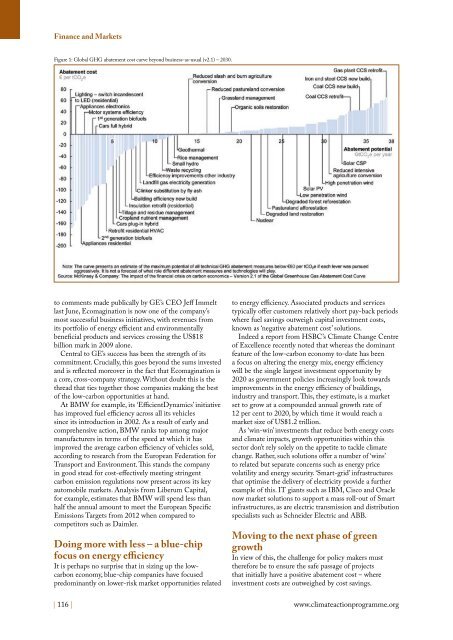Climate Action 2010-2011
Create successful ePaper yourself
Turn your PDF publications into a flip-book with our unique Google optimized e-Paper software.
Finance and Markets<br />
Figure 1: Global GHG abatement cost curve beyond business-as-usual (v2.1) – 2030.<br />
to comments made publically by GE’s CEO Jeff Immelt<br />
last June, Ecomagination is now one of the company’s<br />
most successful business initiatives, with revenues from<br />
its portfolio of energy efficient and environmentally<br />
beneficial products and services crossing the US$18<br />
billion mark in 2009 alone.<br />
Central to GE’s success has been the strength of its<br />
commitment. Crucially, this goes beyond the sums invested<br />
and is reflected moreover in the fact that Ecomagination is<br />
a core, cross-company strategy. Without doubt this is the<br />
thread that ties together those companies making the best<br />
of the low-carbon opportunities at hand.<br />
At BMW for example, its ‘EfficientDynamics’ initiative<br />
has improved fuel efficiency across all its vehicles<br />
since its introduction in 2002. As a result of early and<br />
comprehensive action, BMW ranks top among major<br />
manufacturers in terms of the speed at which it has<br />
improved the average carbon efficiency of vehicles sold,<br />
according to research from the European Federation for<br />
Transport and Environment. This stands the company<br />
in good stead for cost-effectively meeting stringent<br />
carbon emission regulations now present across its key<br />
automobile markets. Analysis from Liberum Capital,<br />
for example, estimates that BMW will spend less than<br />
half the annual amount to meet the European Specific<br />
Emissions Targets from 2012 when compared to<br />
competitors such as Daimler.<br />
Doing more with less – a blue-chip<br />
focus on energy efficiency<br />
It is perhaps no surprise that in sizing up the lowcarbon<br />
economy, blue-chip companies have focused<br />
predominantly on lower-risk market opportunities related<br />
| 116 |<br />
to energy efficiency. Associated products and services<br />
typically offer customers relatively short pay-back periods<br />
where fuel savings outweigh capital investment costs,<br />
known as ‘negative abatement cost’ solutions.<br />
Indeed a report from HSBC’s <strong>Climate</strong> Change Centre<br />
of Excellence recently noted that whereas the dominant<br />
feature of the low-carbon economy to-date has been<br />
a focus on altering the energy mix, energy efficiency<br />
will be the single largest investment opportunity by<br />
2020 as government policies increasingly look towards<br />
improvements in the energy efficiency of buildings,<br />
industry and transport. This, they estimate, is a market<br />
set to grow at a compounded annual growth rate of<br />
12 per cent to 2020, by which time it would reach a<br />
market size of US$1.2 trillion.<br />
As ‘win-win’ investments that reduce both energy costs<br />
and climate impacts, growth opportunities within this<br />
sector don’t rely solely on the appetite to tackle climate<br />
change. Rather, such solutions offer a number of ‘wins’<br />
to related but separate concerns such as energy price<br />
volatility and energy security. ‘Smart-grid’ infrastructures<br />
that optimise the delivery of electricity provide a further<br />
example of this. IT giants such as IBM, Cisco and Oracle<br />
now market solutions to support a mass roll-out of Smart<br />
infrastructures, as are electric transmission and distribution<br />
specialists such as Schneider Electric and ABB.<br />
Moving to the next phase of green<br />
growth<br />
In view of this, the challenge for policy makers must<br />
therefore be to ensure the safe passage of projects<br />
that initially have a positive abatement cost – where<br />
investment costs are outweighed by cost savings.<br />
www.climateactionprogramme.org












